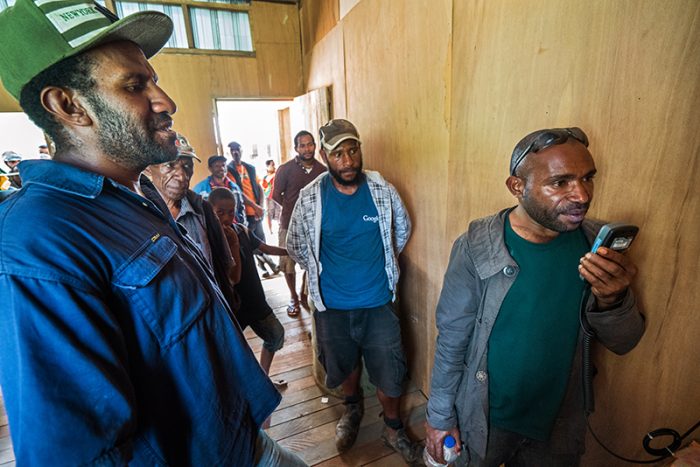A Reflection of 2020 – MAF Technologies
The impact of COVID-19 has been felt across almost all of our programs. It has affected our staff, our ability to serve, and the people we have been able to reach. Below is a summary of how this impact has been felt in our Technology Services program in PNG.
When the world was shutting down, Papua New Guinea was no different and at the beginning of April a daily curfew was put in place for all Goroka residents. High frequency (HF) radio was used by Tech Services to educate, reassure and provide clarity to dozens of communities that have no access to the internet or printed press, but who were hearing rumours of the devastation caused by COVID-19 globally. Country Director Bryan Matthew organised two 45-minute information and training sessions with a Goroka based doctor*.
Remote solar and radio installation work was placed on hold due to the travel restrictions, however the sales and repair of electronic equipment continued. Staff were working full days but starting earlier to allow for an early finish in line with the requirement to be in homes by 4pm.
This situation continued into May. The Tech Services front counter was operational and continued to draw in more customers each day. Precautionary measures were taken to ensure the safety and welfare of both customers and staff. Safety measures included having a maximum of five people in the waiting room, observing social distancing, wearing protective face masks and providing hand sanitizers for both customers and staff.
Solar and HF radio installation work, along with the Tech Ministry training courses were on hold due to travel restrictions.
With the newly established partnership with Eastern Highlands Provincial Health Authority (EHPHA), Tech Services were able to help keep remote communities informed of COVID-19. We installed PA systems into 10 of their vehicles. We also did similar PA system installation on three vehicles for the Henganofi Health Centre, who partnered with EHPHA to do COVID-19 awareness within remote communities that are easily accessible by road.
In mid-June the State of Emergency in PNG was lifted and life was slowly returning to a sort of normal. The local market reopened, allowing residents to buy fresh vegetables and fruits. The Goroka by-election was due to take place and so candidates were moving around conducting their campaigns. Elections in PNG can cause local tension and so the team were monitoring the security situation closely.
Towards the end of June we moved our daily operational hours back to normal – 8am-5pm, continuing to practice the preventative methods introduced during the lockdown. A single case of COVID-19 was reported in Port Moresby and the team remained vigilant.
A technical team travelled to Lae for a large solar project – grid connection for a mission/church which was completed in mid-July.
Bible distribution continued, with pastors travelling great distances to source printed and audio bibles. More requests were coming in from remote rural airstrips to send more printed Bibles as soon as airstrips opened. Tech Services began to coordinate with MAF pilots to try to get the Bible Box to these locations.
In mid-August PNG’s Capital, Port Moresby, went into a 14-day lockdown with an increase of COVID-19 in the community. All domestic travel by air was cancelled, only approved business travel would be permitted, and provincial border crossing was restricted.
Goroka district was in the middle of by-election campaigns and there were many political gatherings. Staff were advised to stay away from such activities due to possible coronavirus community transmission. The election campaigning lasted into September, with police ramping up security efforts and the military on standby as polling day approached. We monitored the situation closely to ensure the safety of our staff. Polling day was delayed three times until the end of September and so this situation continued into the counting phase. In the end, the process was largely peaceful.
Coronavirus rates at this time had slowed and at the beginning of October travel restrictions for both domestic and international travel were lifted. Airline companies were tasked with monitoring passengers’ temperatures, but isolation was reduced from 14 days to seven days. A few new cases of COVID-19 were detected in Goroka and the team remained vigilant.
At the end of October, we had 13 HF Radio installations pending and we continued to work on these into November. We organised a number of medical evacuations through another organisation, mainly mothers in difficult labours, and international staff were able to attend a staff retreat in Mt. Hagen.
The rainy season arrived and, with it, problems such as flooding, landslips, and road blocks due to landslips.
We continue to be available to remote communities via HF radio and, as always, are seeking to provide effective and efficient communications and technical services to the church and community through the ministry and witness of our staff. Despite its challenges, we are very grateful for what we have been able to achieve throughout 2020 and look forward to more in 2021.






